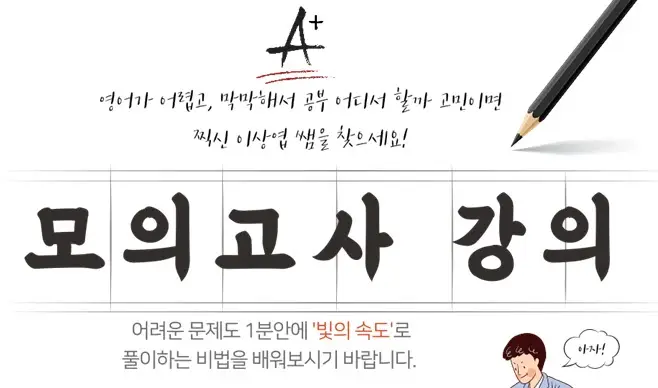대구외고 1학년 2학기 중간고사 시험분석(심화영어)-(8th)
이상엽 쌤은 대구외고 수험생들을 위해 선생님들의 출제경향을 정확히 분석해 맞춤예상 문제를 제공합니다. 영어가 어렵고, 막막해서 공부 어디서 할까 고민이면, 찍신 이상엽 쌤을 찾으세요! 수업문의 010 2818 6994
학교 출제 문제 / 찍신 쌤 출제 문제
심화영어 19번 (내용 일치)

찍신 쌤 시험대비 출제 문제
[39~40] 다음 글을 읽고, 물음에 답하시오.
Cornelius Vanderbilt had just finished a series of business deals to expand his railroad empire.
One of his business advisors leaned in to tell Vanderbilt that every transaction he agreed to broke the law.
“My God, John,” said Vanderbilt, “You don’t suppose you can run a railroad in accordance with the statutes of the State of New York, do you?”
My first thought when reading this was: “That attitude is why he was so successful.” Laws didn’t accommodate railroads during Vanderbilt’s day. So he said “to hell with it” and went ahead anyway. Vanderbilt was wildly successful. So it’s tempting to view his law-flaunting—which was notorious and vital to his success—as sage wisdom. That scrappy visionary let nothing get in his way! ( ① )
But how dangerous is that analysis? No sane person would recommend flagrant crime as an entrepreneurial trait. You can easily imagine Vanderbilt’s story turning out much different—an outlaw whose young company collapsed under court order. ( ② )
So we have a problem here.
You can praise Vanderbilt for flaunting the law with as much passion as you criticize Enron for doing the same. ( ③ )
John D. Rockefeller is similar. His frequent circumventing of the law—a judge once called his company “no better than a common thief”—is often portrayed by historians as cunning business smarts. Maybe it was. But when does the narrative shift from, “You didn’t let outdated laws get in the way of innovation,” to “You committed a crime?” Or how little would the story have to shift for the narrative to have turned from “Rockefeller was a genius, try to learn from his successes,” to “Rockefeller was a criminal, try to learn from his business failures.” ( ④ ) Very little.
“What do I care about the law?” Vanderbilt once said. “Ain’t I got the power?”
He did, and it worked. But it’s easy to imagine those being the last words of a story with a very different outcome. ( ⑤ ) The line between bold and reckless can be thin. When we don’t give risk and luck their proper billing it’s often invisible.
39. 글의 흐름으로 보아, 주어진 문장이 윗글에 들어가기에 가장 적절한 곳을 고르시오.
Perhaps one got lucky by avoiding the arm of the law while the other found itself on the side of risk. |
① ( ① ) ② ( ② ) ③ ( ③ ) ④ ( ④ ) ⑤ ( ⑤ )
40. 윗글의 밑줄 친 Laws didn’t accommodate railroads during Vanderbilt’s day 가 의미하는 바로 가장 적절한 것은?
① The law at the time overlooked Vanderbilt’s disregard or circumvention of the law.
② The legal environment of the time was hostile to large-scale businesses.
③ The laws in place were outdated to govern large-scale business enterprises.
[서술형 7]
윗글의 밑줄 친 The line between bold and reckless can be thin 이 의미하는 바를 <조건>에 맞게 영어로 쓰시오. [4점, 부분 점수 있음]
<조건> |
→
[서술형 8]
윗글의 밑줄 친 When we don’t give risk and luck their proper billing it’s often invisible 이 의미하는 바를 <조건>에 맞게 영어로 쓰시오. [4점, 부분 점수 있음]
<조건> |
When we (A) , (B) .
정답 및 해설
39. ③
40. ③
해석: 당시 시행되던 법률은 대규모 기업을 관리하기에 시대에 뒤떨어져 있었다.
어휘: in place 가동중인, 실행중인
[서술형 7]
There’s a fine distinction between making daring decisions and taking irresponsible actions.
(대담한 결정을 내리는 것과 무책임한 행동을 취하는 것 사이에는 미묘한 차이가 있다.)
[서술형 8]
When people don’t acknowledge the impact of risk and luck in outcomes, the line between bold and reckless behavior becomes invisible.
(사람들이 결과에 미치는 위험과 행운의 영향을 인정하지 않을 때, 대담한 행동과 무모한 행동 사이의 경계가 보이지 않게 된다.)


